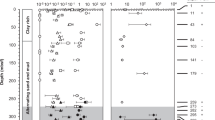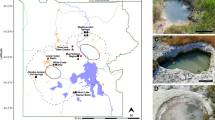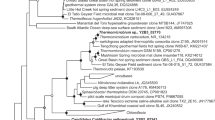Abstract
Acidic peatlands are among the largest natural sources of atmospheric methane and harbour a large diversity of methanogenic Archaea1. Despite the ubiquity of methanogens in these peatlands, indigenous methanogens capable of growth at acidic pH values have resisted culture and isolation2,3,4; these recalcitrant methanogens include members of an uncultured family-level clade in the Methanomicrobiales prevalent in many acidic peat bogs in the Northern Hemisphere1,5,6. However, we recently succeeded in obtaining a mixed enrichment culture of a member of this clade7. Here we describe its isolation and initial characterization. We demonstrate that the optimum pH for methanogenesis by this organism is lower than that of any previously described methanogen.
This is a preview of subscription content, access via your institution
Access options
Subscribe to this journal
Receive 51 print issues and online access
$199.00 per year
only $3.90 per issue
Buy this article
- Purchase on Springer Link
- Instant access to full article PDF
Prices may be subject to local taxes which are calculated during checkout


Similar content being viewed by others
References
Basiliko, N., Yavitt, J. B., Dees, P. M. & Merkel, S. M. Methane biogeochemistry and methanogen communities in two northern peatland ecosystems, New York State. Geomicrobiol. J. 20, 563–577 (2003)
Williams, R. T. & Crawford, R. L. Methanogenic bacteria including an acid-tolerant strain from peatlands. Appl. Environ. Microbiol. 50, 1542–1544 (1985)
Sizova, M. V., Panikov, N. S., Tourova, T. P. & Flanagan, P. W. Isolation and characterization of oligotrophic acido-tolerant methanogenic consortia from a Sphagnum peat bog. FEMS Microbiol. Ecol. 45, 301–315 (2003)
Horn, M. A., Matthies, C., Küsel, K., Schramm, A. & Drake, H. L. Hydrogenotrophic methanogenesis by moderately acid-tolerant methanogens of a methane-emitting acidic peat. Appl. Environ. Microbiol. 69, 74–83 (2003)
Hales, B. A. et al. Isolation and identification of methanogen-specific DNA from blanket bog peat by PCR amplification and sequence analysis. Appl. Environ. Microbiol. 62, 668–675 (1996)
Galand, P. E., Fritze, H. & Yrjala, K. Microsite-dependent changes in methanogenic populations in a boreal oligotrophic fen. Environ. Microbiol. 5, 1133–1143 (2003)
Bräuer, S. L., Yashiro, E., Ueno, N. G., Yavitt, J. B. & Zinder, S. H. Characterization of acid-tolerant H2/CO2-utilizing methanogenic enrichment cultures from an acidic peat bog in New York State. FEMS Microbiol. Ecol. (in the press)
Gorham, E. Northern peatlands role in the carbon cycle and probable responses to climatic warming. Ecol. Appl. 1, 182–195 (1991)
Cicerone, R. J. & Oremland, R. S. Biogeochemical aspects of atmospheric methane. Glob. Biogeochem. Cycles 2, 299–327 (1988)
Brook, E. J. Atmospheric science. Tiny bubbles tell all. Science 310, 1285–1287 (2005)
Kotsyurbenko, O. R. et al. Acetoclastic and hydrogenotrophic methane production and methanogenic populations in an acidic West-Siberian peat bog. Environ. Microbiol. 6, 1159–1173 (2004)
Dedysh, S. N. et al. Isolation of acidophilic methane-oxidizing bacteria from northern peat wetlands. Science 282, 281–283 (1998)
Goodwin, S. & Zeikus, J. G. Ecophysiological adaptations of anaerobic bacteria to low pH: analysis of anaerobic digestion in acidic bog sediments. Appl. Environ. Microbiol. 53, 57–64 (1987)
Galand, P. E., Saarnio, S., Fritze, H. & Yrjala, K. Depth related diversity of methanogen Archaea in Finnish oligotrophic fen. FEMS Microbiol. Ecol. 42, 441–449 (2002)
Cadillo-Quiroz, H. et al. Vertical profiles of methanogenesis and methanogens in two contrasting acidic peatlands in central New York State, USA. Environ. Microbiol. (in the press)
Juottonen, H. et al. Methanogen communities and Bacteria along an ecohydrological gradient in a northern raised bog complex. Environ. Microbiol. 7, 1547–1557 (2005)
Bräuer, S. L., Yavitt, J. B. & Zinder, S. H. Methanogenesis in McLean Bog, an acidic peat bog in upstate New York: stimulation by H2/CO2 in the presence of rifampicin, or by low concentrations of acetate. Geomicrobiol. J. 21, 433–443 (2004)
Könneke, M. et al. Isolation of an autotrophic ammonia-oxidizing marine archaeon. Nature 437, 543–546 (2005)
von Wintzingerode, F., Göbel, U. B. & Stackebrandt, E. Determination of microbial diversity in environmental samples: pitfalls of PCR-based rRNA analysis. FEMS Microbiol. Rev. 21, 213–229 (1997)
Morris, R. M. et al. SAR11 clade dominates ocean surface bacterioplankton communities. Nature 420, 806–810 (2002)
Raskin, L., Stromley, J. M., Rittmann, B. E. & Stahl, D. A. Group specific 16S rRNA hybridization probes to describe natural communities of methanogens. Appl. Environ. Microbiol. 60, 1232–1240 (1994)
Angert, E. R. Alternatives to binary fission in bacteria. Nature Rev. Microbiol. 3, 214–224 (2005)
Patel, G. B., Sprott, G. D. & Fein, J. E. Isolation and characterization of Methanobacterium espanolae sp. nov., a mesophilic moderately acidophilic methanogen. Int. J. Syst. Bacteriol. 40, 12–18 (1990)
Maestrojuan, G. M. & Boone, D. R. Characterization of Methanosarcina barkeri MST and 227 Methanosarcina mazei S-6T and Methanosarcina vacuolata Z-761T. Int. J. Syst. Bacteriol. 41, 267–274 (1991)
Franzmann, P. D. et al. Methanogenium frigidum sp. nov., a psychrophilic, H2-using methanogen from Ace Lake, Antarctica. Int. J. Syst. Bacteriol. 47, 1068–1072 (1997)
Acknowledgements
We thank E. Angert and W. Ghiorse for microscopy advice and equipment, R. Morris and S. Dedysh for advice on FISH, M. McInerney for providing us with cultures of M. hungatei JF1, and H. Trüper for advice on naming the organism. This work was supported by the NSF Microbial Observatories Program.
Author information
Authors and Affiliations
Corresponding author
Ethics declarations
Competing interests
Reprints and permissions information is available at npg.nature.com/reprintsandpermissions. The authors declare no competing financial interests.
Supplementary information
Supplementary Notes
This file contains the Supplementary Methods section with references and Supplementary Figures 1 and 2. (DOC 361 kb)
Rights and permissions
About this article
Cite this article
Bräuer, S., Cadillo-Quiroz, H., Yashiro, E. et al. Isolation of a novel acidiphilic methanogen from an acidic peat bog. Nature 442, 192–194 (2006). https://doi.org/10.1038/nature04810
Received:
Accepted:
Published:
Issue Date:
DOI: https://doi.org/10.1038/nature04810
This article is cited by
-
Microbial Endeavours Towards Extra-terrestrial Settlements
Journal of the Indian Institute of Science (2023)
-
Only mass migration of fungi runs through the biotopes of soil, phyllosphere, and feces
Journal of Soils and Sediments (2021)
-
Potential Microbial Indicators for Better Bioremediation of an Aquifer Contaminated with Vinyl Chloride or 1,1-Dichloroethene
Water, Air, & Soil Pollution (2020)
-
The Effects of pH, Temperature, and Humic-Like Substances on Anaerobic Carbon Degradation and Methanogenesis in Ombrotrophic and Minerotrophic Alaskan Peatlands
Aquatic Geochemistry (2020)
-
An evolving view of methane metabolism in the Archaea
Nature Reviews Microbiology (2019)
Comments
By submitting a comment you agree to abide by our Terms and Community Guidelines. If you find something abusive or that does not comply with our terms or guidelines please flag it as inappropriate.



